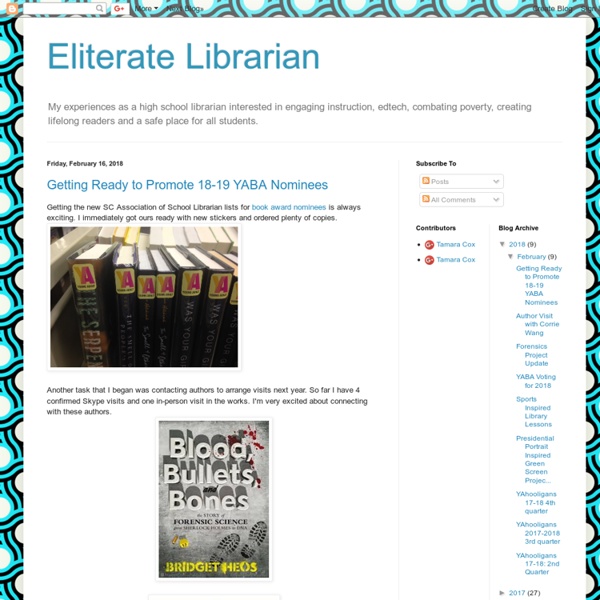Zoom
Trash
Related: ladyluckmelissa



Top 100 Education Blogs for Educators and Teachers - Education Blog Top 100 Education blogs The Best Education blogs from thousands of top Education blogs in our index using search and social metrics. Data will be refreshed once a week. If your blog is selected in this list, you have the honour of displaying this Badge (Award) on your blog. Submit Your Blog These blogs are ranked based on following criteria Google reputation and Google search rankingInfluence and popularity on Facebook, twitter and other social media sitesQuality and consistency of posts.Feedspot’s editorial team and expert review CONGRATULATIONS to every blogger that has made this Top Education blogs list! If your blog is one of the Top 100 Education blogs, you have the honour of displaying the following badge on your site. If your blog is one of the Top 200 Education blogs, you have the honour of displaying the following badge on your site.
Librarydoor Wire Side Chat: Bernie Dodge on WebQuests Why were WebQuests developed? Why should teachers use them? What does the future hold for educational technology? WebQuest creator Bernie Dodge answers those questions and more. Bernie Dodge, a professor of educational technology at San Diego State University, has been cited by eSchool News as one of the nation's top 30 educational technology innovators. Probably best known as the creator of the WebQuest model for technology integration, Dodge is also the author of a number of educational software packages for children and technology tools for educators. This week, Dodge shares with Education World readers his thoughts about WebQuests -- and about the future of educational technology. Education World: What drew you to the field of educational technology -- at a time when it wasn't even a field yet? Bernie Dodge: Hey ... EW: Would you describe briefly how and why you developed the WebQuest model? Dodge: It started with a course I was teaching for second-semester student teachers.
Endless Possibilities | Reflections & Resources– Jennifer Casa-Todd Infosavvy: A School Librarian's Blog Informania Learning in Progress (Heidi Neltner) Kristin Fontichiaro's Blog Building professional capacityTeacher-librarians are well positioned to impart data literacy to teens, but who’s giving instructors the resources and support that they need to do so?Kristin Fontichiaro, clinical associate professor at University of Michigan’s School of Information, and Jo Angela Oehrli, learning librarian at University of Michigan Library, were up for the task. As principal investigators of the two-year IMLS-funded project “Supporting Librarians in Adding Data Literacy Skills to Information Literacy Instruction,” they set out to design materials for high school librarians looking to foster data and statistical literacy skills in their students.
Dr. Violet Harada Working as a librarian and as an administrator in lower education and then as a teacher and researcher in a university graduate program, I developed a fresh appreciation for both worlds. Through the years, I have maintained close ties with field practitioners and always strived to involve them in the research and scholarship of our profession. By challenging myself to place ideas in larger contexts, I have also shared the excitement of my own learning with both students and colleagues and invited them to join me in a free exchange of ideas. My goals continue to be: Preparing our LIS candidates to be dynamic school librarians in 21st century schools; and Promoting learning in P-20 settings that guide young learners to be responsible, critical, and caring thinkers, consumers of information, and creators of knowledge and ideas. Current Research Interests Intervention and assessment strategies in teaching information searching process. Areas of Special Competence Works
The Library Voice (Shannon MIller) The Adventures of Library Girl Benjamin Bloom Benjamin Bloom (February 21, 1913 - September 13, 1999) was an American educational psychologist who made significant contributions to the classification of educational objectives and the theory of mastery learning. His research, which showed that educational settings and home environments can foster human potential, transformed education. Bloom developed a "taxonomy of educational objectives" which classified the different learning objectives and skills that educators set for students. Bloom divided educational objectives into three "domains:" Affective, Psychomotor, and Cognitive. Bloom also carried out significant research on mastery learning, showing that it is not innate giftedness that allows one to succeed, but rather hard work. Life Benjamin S. As a youth, Bloom had an insatiable curiosity about the world. Bloom was especially devoted to his family (his wife, Sophie, and two sons), and his nieces and nephews. Benjamin Bloom died Monday, Sept. 13, 1999 in his home in Chicago.